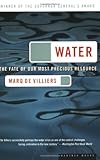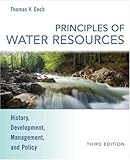|
|
Help |
| Home - Environment - Water Resources (Books) | |
e99 Online Shopping Mall
|
|
Help |
| Home - Environment - Water Resources (Books) | |
| 1-20 of 98 | Next 20 |
click price to see details click image to enlarge click link to go to the store
| 1. Water Resources Engineering by Larry W. Mays | |
 | Hardcover: 890
Pages
(2010-06-08)
-- used & new: US$79.97 (price subject to change: see help) Asin: 0470460644 Average Customer Review: Canada | United Kingdom | Germany | France | Japan |
|
Editorial Review Product Description Customer Reviews (6)
| |
| 2. Principles of Water Resources: History, Development, Management, and Policy by Thomas V. Cech | |
 | Paperback: 488
Pages
(2004-06-28)
-- used & new: US$30.00 (price subject to change: see help) Asin: 047148475X Average Customer Review: Canada | United Kingdom | Germany | France | Japan |
|
Editorial Review Product Description Customer Reviews (3)
| |
| 3. Water-Resources Engineering (2nd Edition) by David A. Chin | |
 | Hardcover: 976
Pages
(2006-04-13)
list price: US$164.00 -- used & new: US$128.40 (price subject to change: see help) Asin: 0131481924 Average Customer Review: Canada | United Kingdom | Germany | France | Japan |
|
Editorial Review Product Description This in-depth review of water-resources engineering essentials focuses on both fundamentals and design applications. Emphasis on fundamentals encourages readers’ understanding of basic equations in water-resources engineering and the background that is necessary to develop innovative solutions to complex problems. Comprehensive design applications illustrate the practical application of the basic equations of water-resources engineering. Full coverage of hydraulics, hydrology, and water-resources planning and management is provided. Hydraulics is separated into closed-conduit flow and open-channel flow, and hydrology is separated into surface-water hydrology and ground-water hydrology. For professionals looking for a reference book on water-resources engineering. Customer Reviews (3)
| |
| 4. Water Resource Economics: The Analysis of Scarcity, Policies, and Projects by Ronald C. Griffin | |
 | Hardcover: 424
Pages
(2006-01-01)
list price: US$53.00 -- used & new: US$42.80 (price subject to change: see help) Asin: 026207267X Canada | United Kingdom | Germany | France | Japan |
|
Editorial Review Product Description | |
| 5. Water: The Fate of Our Most Precious Resource by Marq de Villiers | |
 | Paperback: 368
Pages
(2001-07-12)
list price: US$16.00 -- used & new: US$6.89 (price subject to change: see help) Asin: 0618127445 Average Customer Review: Canada | United Kingdom | Germany | France | Japan |
|
Editorial Review Product Description De Villiers examines the checkeredhistory of humankind's management of water--which, he hastens toremind us, is not a renewable resource in many parts of the world. Oneof them is the Nile River region, burdened by overpopulation. Anotheris the Sahara, where Libyan ruler Muammar Qaddafi is pressing anambitious, and potentially environmentally disastrous, campaign tomine deep underground aquifers to make the desert green. Another isnorthern China, where the damaging effects of irrigation havedestroyed once-mighty rivers, and the Aral Sea of Central Asia, whichwas killed within a human lifetime. And still another is the AmericanSouthwest, where crops more fitting to a jungle than a dry land arenursed. De Villiers travels to all these places, reporting on what hesees and delivering news that is rarely good. De Villiers has akeen eye for detail and a solid command of the scientific literatureon which his argument is based. He's also a fine storyteller, and hiswide-ranging book makes a useful companion to Marc Reisner's classicCadillac Desertand other works that call our attention to a globally abused--andvital--resource. --Gregory McNamee Customer Reviews (14)
| |
| 6. Written in Water: Messages of Hope for Earth's Most Precious Resource | |
 | Hardcover: 304
Pages
(2010-02-16)
list price: US$26.00 -- used & new: US$4.84 (price subject to change: see help) Asin: 1426205724 Average Customer Review: Canada | United Kingdom | Germany | France | Japan |
|
Editorial Review Product Description Customer Reviews (1)
| |
| 7. Geographic Information Systems in Water Resources Engineering by Lynn E. Johnson | |
 | Hardcover: 328
Pages
(2008-12-17)
list price: US$125.95 -- used & new: US$85.01 (price subject to change: see help) Asin: 1420069136 Canada | United Kingdom | Germany | France | Japan |
|
Editorial Review Product Description State-of-the-art GIS spatial data management and analysis tools are revolutionizing the field of water resource engineering. Familiarity with these technologies is now a prerequisite for success in engineers’ and planners’ efforts to create a reliable infrastructure. GIS in Water Resource Engineering presents a review of the concepts and applications of GIS in the various sub-fields of water resource engineering. After a summary review of analyses and database functions, the book addresses concepts and applications in the following areas: The book develops a general understanding of the nature of GIS and how it is used to create and analyze geographic data. The author first introduces primary field data collection methods and describes procedures for interpretation and analysis. The second portion of the book focuses on the linkage of GIS data with water resource analysis and management models. Applications are presented with descriptions of GIS database development, analysis background theory, and model integration with GIS. The profound impact of GIS systems on water resources engineering continues to grow. GIS in Water Resource Engineering arms engineers and planners with an arsenal of tools to assist in the creation of a reliable, environmentally sensitive, infrastructure. | |
| 8. The Evolution of Water Resource Planning and Decision Making by Clifford S. Russell, Duane D. Baumann | |
| Paperback: 320
Pages
(2010-02-28)
list price: US$50.00 -- used & new: US$46.00 (price subject to change: see help) Asin: 1848447159 Canada | United Kingdom | Germany | France | Japan | |
|
Editorial Review Product Description The book explores the evolution of water related analytical capabilities and institutions and provides illustrations from case studies, concluding with recommendations for research, institutional change and action. Though designed to be a background textbook for interdisciplinary graduate seminars in water resources planning and management, it is accessible to interested lay readers and those who have policymaking or implementation responsibility but lack a technical background. The book will appeal to students and faculty in water policy, economics, and engineering, and in interdisciplinary programs organized around water resource problems and questions. Policy makers and general readers will also appreciate this non-technical introduction. | |
| 9. Six-Minute Solutions for Civil PE Exam Problems: Water Resources by R. Wane Schneiter | |
 | Paperback: 168
Pages
(2003-07)
list price: US$72.00 -- used & new: US$124.99 (price subject to change: see help) Asin: 1888577908 Average Customer Review: Canada | United Kingdom | Germany | France | Japan |
|
Editorial Review Product Description Customer Reviews (7)
| |
| 10. Water (True Books: Natural Resources) by Christin Ditchfield | |
 | Paperback: 48
Pages
(2003-03)
list price: US$6.95 -- used & new: US$19.57 (price subject to change: see help) Asin: 0516293699 Canada | United Kingdom | Germany | France | Japan |
|
Editorial Review Product Description | |
| 11. Planet Water: Investing in the World's Most Valuable Resource by Steve Hoffmann | |
 | Hardcover: 352
Pages
(2009-04-06)
list price: US$39.95 -- used & new: US$22.05 (price subject to change: see help) Asin: 0470277408 Average Customer Review: Canada | United Kingdom | Germany | France | Japan |
|
Editorial Review Product Description Customer Reviews (2)
| |
| 12. Economics of Water Resources Planning by L. Douglas James, Robert R. Lee | |
 | Hardcover: 640
Pages
(1971-02)
list price: US$36.50 Isbn: 0070322635 Canada | United Kingdom | Germany | France | Japan |
|
Editorial Review Product Description | |
| 13. Introduction to Water Resources and Environmental Issues by Karrie Lynn Pennington, Thomas V. Cech | |
 | Hardcover: 468
Pages
(2010-01-18)
list price: US$65.00 -- used & new: US$56.01 (price subject to change: see help) Asin: 0521869889 Canada | United Kingdom | Germany | France | Japan |
|
Editorial Review Product Description | |
| 14. Exploring Water Resources: GIS Investigations for the Earth Sciences, ArcGIS? Edition by Michelle K. Hall, C. Scott Walker, Anne Huth, Larry P. Kendall, Jennifer A. Weeks, Jeff S. Jenness | |
 | Paperback: 176
Pages
(2006-09-07)
list price: US$52.95 -- used & new: US$42.31 (price subject to change: see help) Asin: 0495115126 Canada | United Kingdom | Germany | France | Japan |
|
Editorial Review Product Description | |
| 15. Principles of Water Resources: History, Development, Management, and Policy by Thomas V. Cech | |
 | Hardcover: 576
Pages
(2009-08-24)
-- used & new: US$62.50 (price subject to change: see help) Asin: 0470136316 Canada | United Kingdom | Germany | France | Japan |
|
Editorial Review Product Description | |
| 16. Handbook of Water Resources in India: Development, Management, and Strategies by The World Bank | |
| Hardcover: 584
Pages
(2007-03-15)
list price: US$99.00 -- used & new: US$29.93 (price subject to change: see help) Asin: 019568561X Canada | United Kingdom | Germany | France | Japan | |
|
Editorial Review Product Description | |
| 17. Integrated Water Resources Management in Practice: Better Water Management for Development | |
 | Paperback: 250
Pages
(2009-03)
list price: US$77.95 -- used & new: US$55.54 (price subject to change: see help) Asin: 1844076504 Canada | United Kingdom | Germany | France | Japan |
|
Editorial Review Product Description | |
| 18. Water Resources Systems Analysis by Mohammad Karamouz, Ferenc Szidarovszky, Banafsheh Zahraie | |
 | Hardcover: 608
Pages
(2003-06-27)
list price: US$162.95 -- used & new: US$128.99 (price subject to change: see help) Asin: 1566706424 Canada | United Kingdom | Germany | France | Japan |
|
Editorial Review Product Description | |
| 19. Water Resources for Lodging Operations by Stephani Robson, David M. Stipanuk | |
| Paperback: 144
Pages
(1995-09)
list price: US$63.95 -- used & new: US$160.84 (price subject to change: see help) Asin: 0866121277 Canada | United Kingdom | Germany | France | Japan | |
| 20. Globalization of Water: Sharing the Planet's Freshwater Resources by Arjen Y. Hoekstra, Ashok K. Chapagain | |
 | Hardcover: 224
Pages
(2008-02-05)
list price: US$69.95 -- used & new: US$51.73 (price subject to change: see help) Asin: 1405163356 Average Customer Review: Canada | United Kingdom | Germany | France | Japan |
|
Editorial Review Product Description Customer Reviews (1)
| |
| 1-20 of 98 | Next 20 |